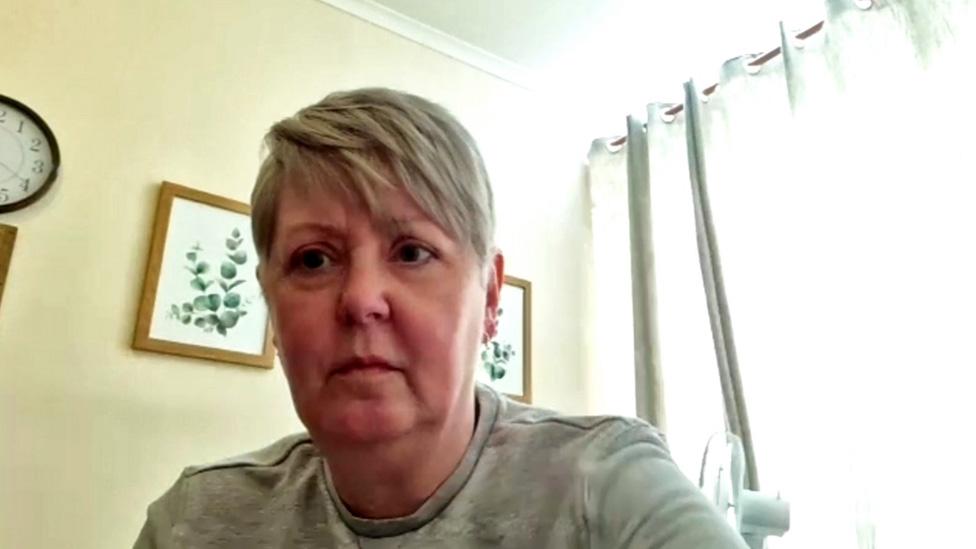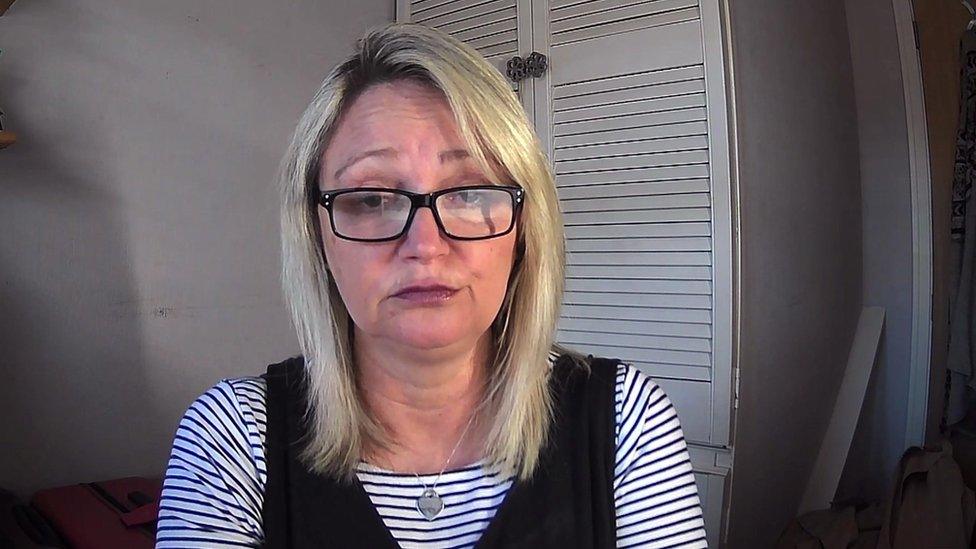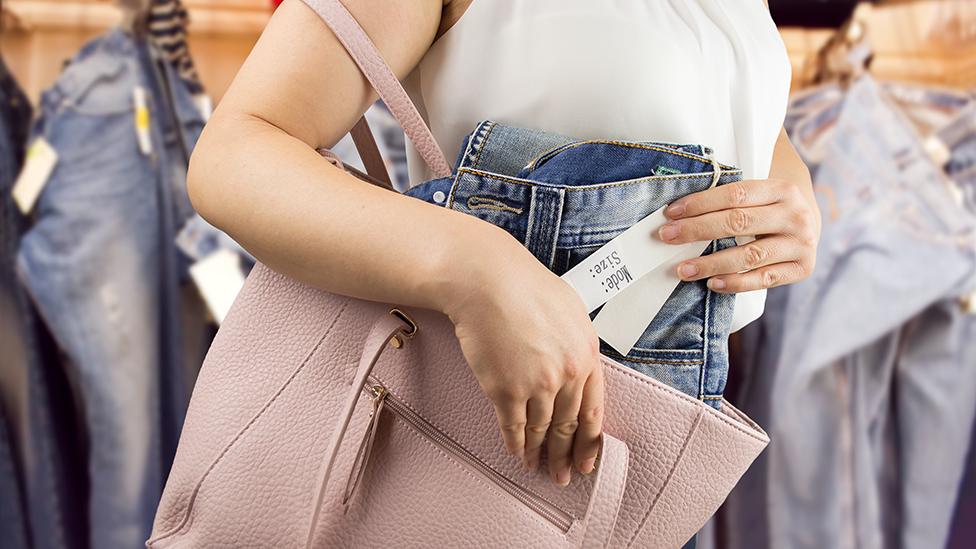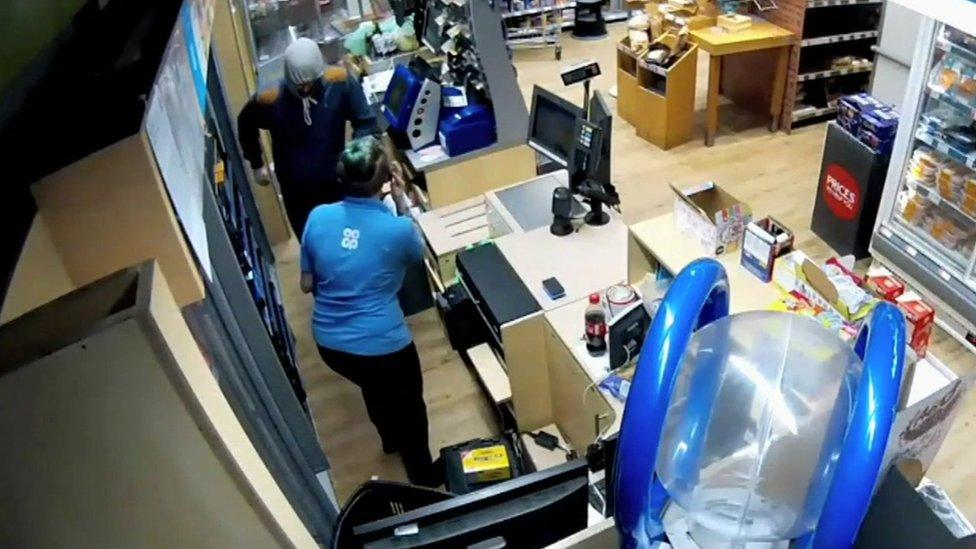'We go to work to serve customers, not to be abused'
- Published
- comments

Jo Crumplin says abusive behaviour towards retail workers is on the rise
Jo Crumplin, a team leader at a convenience store in Northumberland, says she and her staff experience threatening, abusive behaviour from customers week in, week out.
"I've been told, 'I hope you get cancer and die,'" she says.
Some two in five retail workers face abuse from customers on a regular basis, new research suggests.
The Retail Trust, the charity behind the research, said that staff were being shouted at, spat on or hit.
The charity's report comes as retail giants including Sainsbury's, Boots, M&S and Aldi are urging police forces across the UK to offer staff more protection.
The Home Office said that retail crime would "not be tolerated".
Ms Crumplin has worked in retail for 11 years and says she thinks the threatening behaviour is increasing.
"We go into work to do a job... to serve customers, stack shelves. We don't go into work to be abused," she says.
She blames a rise in shoplifting. Challenging shoplifters is often the cause for a confrontation, she says, something which the report also found.
UK retailers have been dealing with a big rise in shoplifting driven in part by the cost-of-living crisis, which has coincided with an increase in threats against staff.
Firms such as Tesco and Aldi have begun to roll out body-worn cameras across their stores, but some retail bosses say the police need to take the problem more seriously.
The Retail Trust spoke to more than 1,600 shop workers from 200 companies such as Tesco, H&M and the Co-op. It found that almost half feel unsafe at work, while a quarter did not report incidents of abuse, partly because of a poor response from police in the past.
The police recently committed to attend more crime scenes and use facial recognition to target offenders.
Jane, a check-out supervisor from Mold in north Wales, told BBC Breakfast that she felt retail abuse was "more common now than it ever has been".
She described a "massive increase" during Covid lockdowns when staff had to introduce changes to the way customers were shopping like one-way systems or social distancing measures.
She said one shopper had stood "nose-to-nose" with her and threatened her verbally, which was "particularly threatening" at the height of the pandemic.

Shop worker Jane said she felt retail abuse was "more common now than it ever has been"
Since then, the increased cost of living has meant shoppers might be more frustrated when they get to the tills, particularly if they are asked for photo ID when buying restricted items, she said.
"Shopping isn't as fun as it used to be. Everything's gone up in price for whatever reason and customers don't like it and the staff generally get the brunt of it."
In an open letter organised by the Institute of Customer Service, more than 50 businesses including John Lewis and the Post Office, as well as several MPs, urged the government to ensure assaults on shop workers were better recorded.
This would include recording such crimes separately in police statistics, they said.
Separately, the Co-op said on Monday that it had recorded 300,000 incidents so far this year of shoplifting, abuse, violence and anti-social behaviour in its chain of shops.
It marks a 40% increase compared with the same period in 2022. In the majority of the 3,000 most serious cases, it said the police had failed to attend when requested.
Paul Gerrard, director of public affairs at the Co-op, told the BBC's Today programme that rather than individuals stealing a loaf of bread or a pint of milk to feed themselves, the chain was now seeing "prolific offenders".
He said workers were "seeing individuals and organised gangs coming in to take out the entire meat section, the entire spirit section, the entire household cleaning section, and those kind of individuals will stop at nothing".
A number of retailers have announced that they are investing in additional security or body-worn cameras for staff to combat violent behaviour.
Lidl, for example, announced last week that staff across its 960 UK stores would wear body cameras, although they will not be required for all workers.
Its boss said that the additional safety measures would cost £2m and that "retail crime is something that is impacting the whole industry".
According to the latest figures from the British Retail Consortium, external, incidents of violence and abuse had almost doubled on pre-pandemic levels to 867 incidents every day in 2021-22.
A spokesperson for the Home Office said: "It is completely unacceptable to threaten or assault shop workers. We have recently put aggravated sentences for assaults on shop workers into law, showing that these crimes will not be tolerated."
They said that the policing minister was clear that police should take a zero tolerance approach to crime, especially where violence is used, adding that the recent Retail Crime Action Plan would see police attending more crime scenes and patrolling badly affected areas.

Are you affected by the issues raised in this story? Share your experiences by emailing haveyoursay@bbc.co.uk, external.
Please include a contact number if you are willing to speak to a BBC journalist. You can also get in touch in the following ways:
WhatsApp: +44 7756 165803
Tweet: @BBC_HaveYourSay, external
Please read our terms & conditions and privacy policy
If you are reading this page and can't see the form you will need to visit the mobile version of the BBC website to submit your question or comment or you can email us at HaveYourSay@bbc.co.uk, external. Please include your name, age and location with any submission.
Related topics
- Published12 September 2023

- Published27 July 2023
